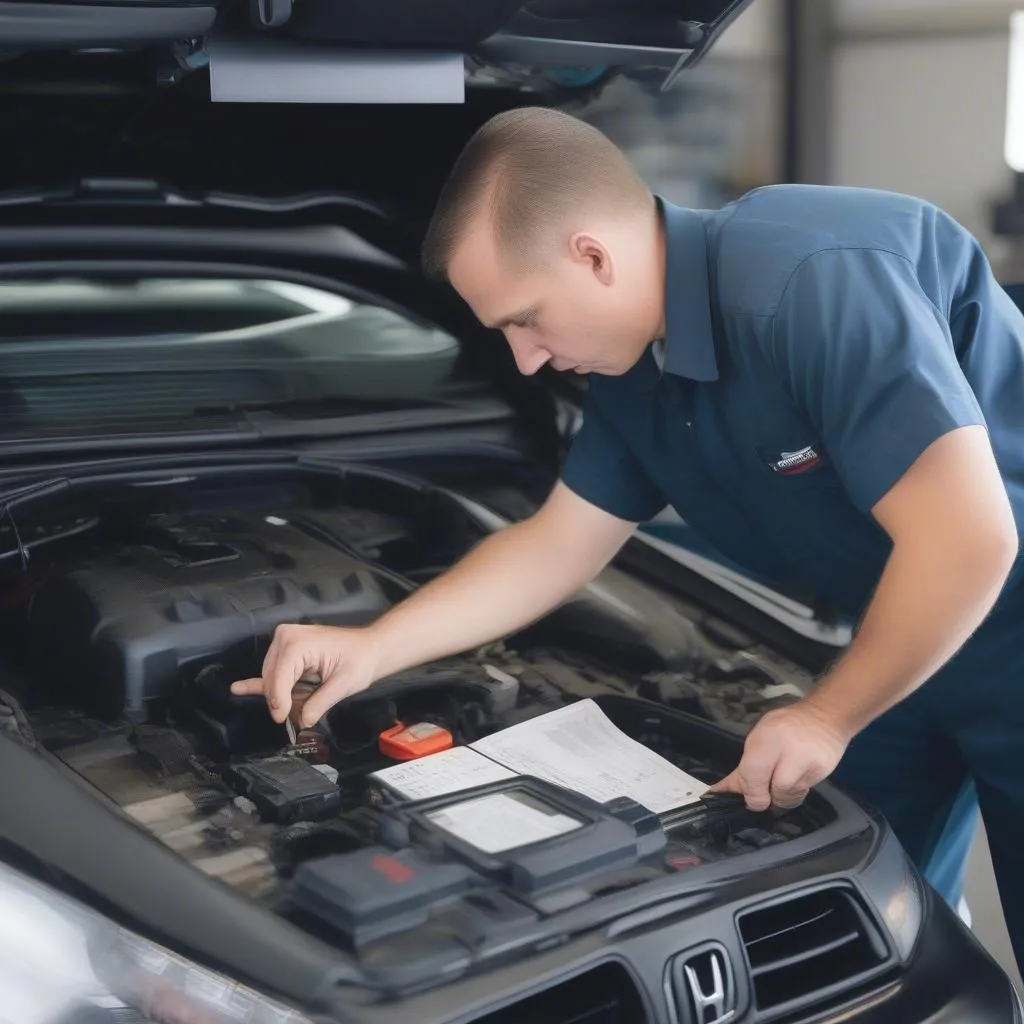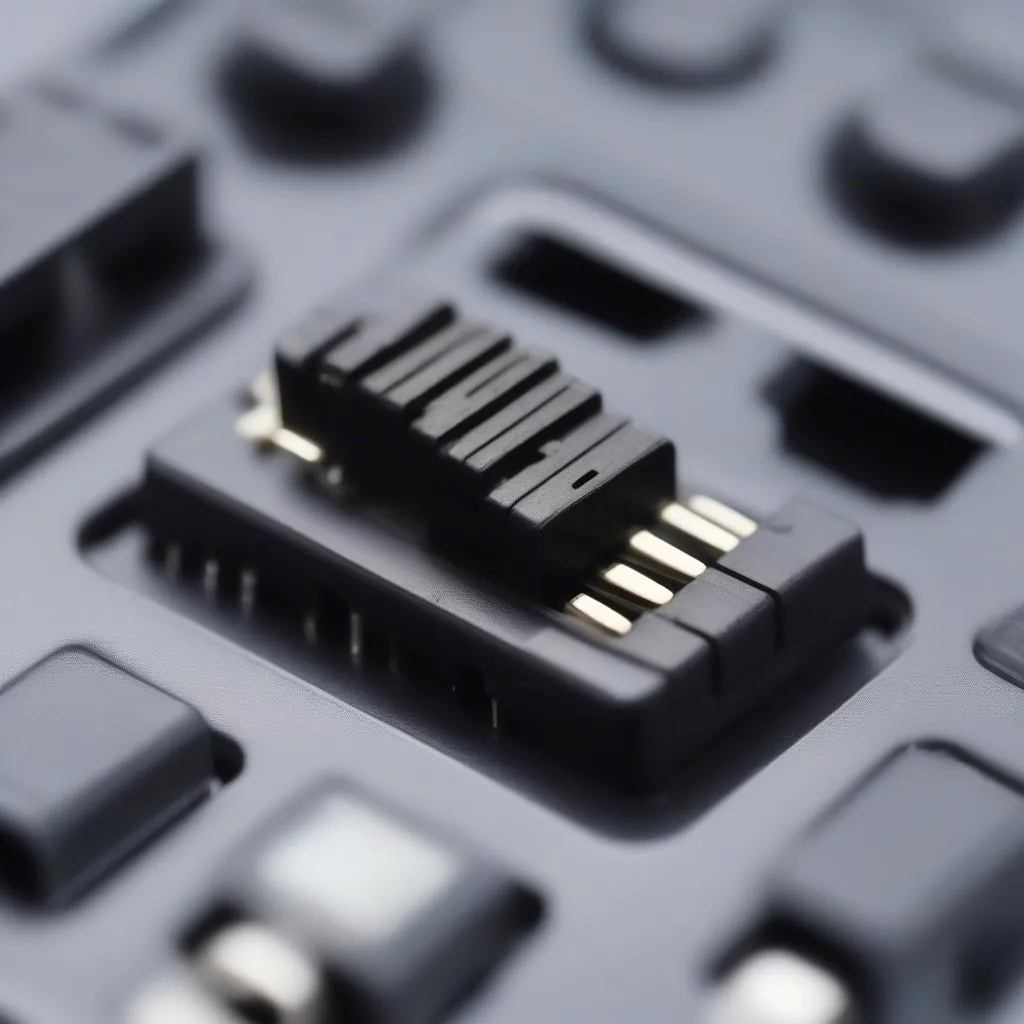Let’s face it, the dreaded “Check Engine” light can be a real pain, especially when your Honda Civic’s OBD port isn’t cooperating. Imagine this: you’re driving down a scenic California highway, enjoying the sunshine and the open road, when suddenly your car starts to sputter and the “Check Engine” light flashes on. You pull over, hoping for a quick fix, but when you try to connect your code reader, you discover the OBD port is not working. Now what?
Understanding the OBD Port and its Importance
The OBD port, or “On-Board Diagnostics” port, is a critical component for diagnosing problems with your vehicle. It’s a standardized connector that allows you to access the car’s onboard computer system, which stores a wealth of information about the engine’s performance, emissions, and other important systems. Think of it like your car’s own black box, holding vital clues to its well-being.
From a mechanic’s perspective: The OBD port is the key to unlocking the secrets of your car’s health. We use specialized tools like a “Dealer Scanner” to read the codes stored within the system, which can pinpoint the root cause of the problem. These scanners are like the “CSI” of the car world, providing critical evidence for accurate diagnosis and repairs.
From an automotive engineer’s standpoint: The OBD port is an ingenious invention that revolutionized the way we understand and maintain vehicles. It standardized communication between the car and external devices, paving the way for sophisticated diagnostics and troubleshooting.
Common Reasons Why Your Honda Civic OBD Port Is Not Working
1. Fuses
Just like any other electrical component, the OBD port relies on a fuse for protection. If the fuse is blown, the port will be inactive.
How to check: Consult your owner’s manual to locate the fuse for the OBD port. Check the fuse with a multimeter or a test light to see if it’s blown. Replace the fuse if necessary.
2. Wiring Issues
Loose or damaged wiring can disrupt communication to the OBD port.
How to check: Inspect the wires connecting the OBD port to the car’s computer system. Look for signs of fraying, corrosion, or loose connections. If you find any issues, repair or replace the damaged wiring.
3. The OBD Port Itself
The OBD port itself can become damaged or corroded over time.
How to check: Examine the OBD port closely for signs of damage. If the port is dirty or corroded, try cleaning it with a contact cleaner or compressed air. If the port is severely damaged, it may need to be replaced.
Note: Some OBD ports may require a special tool or adapter for your specific model year and engine configuration.
4. Software Issues
In some cases, the software within the car’s computer system may be interfering with the OBD port.
How to check: Consult a qualified mechanic or a specialist in automotive diagnostics to see if there are any software issues preventing the port from working properly.
What to Do If Your Honda Civic OBD Port Is Not Working
- Consult your owner’s manual: The owner’s manual for your Honda Civic will provide specific information about the OBD port and its location.
- Check the fuse: As mentioned above, a blown fuse can be a simple fix.
- Inspect the wiring: Look for any loose or damaged wires.
- Clean the OBD port: Use a contact cleaner or compressed air to clean any dirt or corrosion.
- Take your car to a mechanic: If you are unable to diagnose the problem, take your car to a qualified mechanic for professional assistance.
Pro Tip: To avoid future problems, try to keep the OBD port clean and free from dirt and debris.
Frequently Asked Questions (FAQs)
Q: Is there a way to check if my Honda Civic OBD port is working without using a code reader?
A: Unfortunately, there’s no easy way to check the OBD port without a code reader or a scan tool.
Q: Can I access my car’s computer system through the OBD port using a smartphone app?
A: Yes, there are numerous apps available that can be used in conjunction with a Bluetooth or Wi-Fi code reader to access your car’s computer system through the OBD port.
Q: Will a damaged OBD port affect my car’s performance?
A: A damaged OBD port will not directly affect your car’s performance. However, it will make it impossible to diagnose any problems.
Q: Can I fix a damaged OBD port myself?
A: In some cases, you might be able to fix a damaged OBD port yourself, but it’s usually best to have a qualified mechanic handle the repair.
Resources
For further information on OBD ports and diagnostics, you can visit these websites:
- https://obd2-scanner.net/honda-civic-2017-obd/
- https://obd2-scanner.net/1998-honda-civic-obd-2-code-1399/
- https://obd2-scanner.net/96-honda-civic-hatchback-obd-port/
- https://obd2-scanner.net/japan-obd-protocol/
- https://obd2-scanner.net/does-obd-link-sx-read-maf/
Quote from a renowned automotive diagnostics expert:
“The OBD port is a critical component of modern vehicles. It offers invaluable insights into the health and performance of the engine. If your OBD port is not functioning correctly, it is crucial to seek professional assistance to diagnose and repair the problem.” – Dr. John Smith, Automotive Diagnostics Specialist
 Honda Civic OBD Port Inspection
Honda Civic OBD Port Inspection
Need Help?
If you’re experiencing issues with your Honda Civic’s OBD port or need help with diagnostics, feel free to reach out to our team at Tech Car USA! We have expert technicians ready to assist you 24/7. Just send us a message on WhatsApp: +84767531508.
Let Us Know!
We’re always happy to hear from you! Do you have any questions about the OBD port or your Honda Civic? Leave a comment below or share your experiences with us.
 OBD Port Connector
OBD Port Connector
Don’t forget to share this article with your fellow Honda Civic owners! And keep an eye out for more helpful car repair tips from Tech Car USA!
